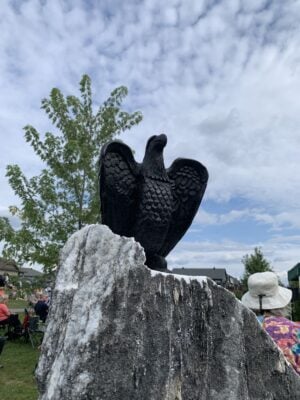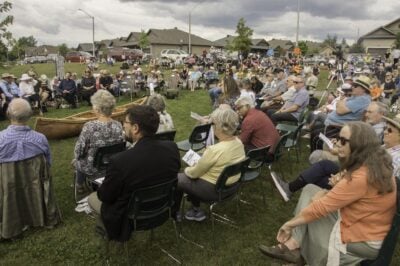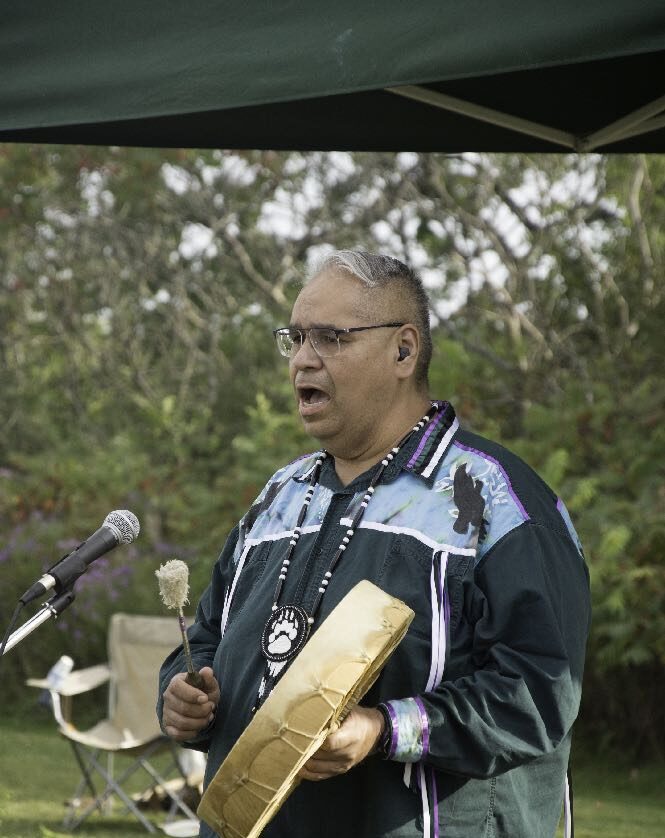On Sept. 17, a crowd gathered on the bank of the Mississippi River in Almonte, Ont., to celebrate the official unveiling of The Seven Gifts, a permanent art installation that honours Algonquin teachings and history in the area.
Speaking on behalf of the Mississippi Mills All My Relations Group, John Coderre told the more than 200 people gathered that the circle of seven stones and animal carvings represents “the work of a creative team that included both Indigenous and non-Indigenous people working together— true model of what truth and reconciliation can be,” he said. “The installation is a reminder that although Mississippi Mills is only 200 years old, the Algonquin have used this land and that waterway for thousands of years. The Seven Gifts is not only a great work of art, but it provides a sacred space in our community and a continuing opportunity for everyone to learn and seek healing with one another and with the land.”
Seven large stones donated by the Tatlock Quarry are arranged in a circle in Almonte’s Riverfront Park. Artist Deborah Arnold was commissioned to carve the stones and provide a place on each for a spirit animal carving. Algonquin artist Nish Nabie was commissioned to carve seven spirit animals. The eagle represents love; the beaver, wisdom; the turtle, truth; the buffalo, respect; the wolf, humility; the raven, honesty; and the bear, bravery. His carvings were then cast in wax by Darlene McLeod and then into bronze by Almonte sculptor Dale Dunning.

The Eagle is love, in Algonquin teachings. Photo: Leigh Anne Williams
Together, the stones and animals, “celebrate the Seven Teachings brought to a child from the Seven Grandfathers of the Algonquin Anishinaabeg,” a sign at the circle explains, encouraging visitors to “Come, with hearts open and full of child-like wonder” and contemplate the meaning of each gift.
Anglicans were key supporters of the project. The Anglican Diocese of Ottawa provided a grant of $10,000 through its All My Relations Circle, and the Anglican Foundation of Canada provided another grant of $15,000.
Sue Evans, co-chair of the Mississippi Mills All My Relations group, offered a land acknowledgment that also acknowledged injustices in local history as Mississippi Mills marks its bicentennial year. “For the past several hundred years, we, as a society, have been oblivious to the harm our people have caused to both your people and to this land. Two hundred years ago, not long after the War of 1812, with your people’s help, we were able to prevent the takeover of this land by the Americans. Then we moved into this territory, forgetful of your tremendous contribution, and took it over to make it our own. We pushed you either onto a reserve, or if you chose not to go, deeper into the woods to try to survive however you could,” she said. “We know from the graves we’ve discovered on a hill in Pakenham that many of you died from diseases we had brought with us from our homeland. We confess that we have destroyed the original trust that once existed between us. We seek then to do what we can to grow in our understanding of these truths, to revise the history we tell ourselves, and to renew friendships with you if you are willing.”
Nish Nabie sang an Algonquin song at the ceremony, and he spoke about his mother’s suffering as a survivor of residential school and losing him as an infant in the Sixties Scoop when many Indigenous children were taken away from their families. Nabie spent 20 years as a First Nations police officer and only began carving after he was injured on the job and had to stop working as an officer. He thanked the Mississippi Mills All My Relations Group for recognizing him as an artist.
He thanked his wife Lona for her encouragement as he worked on the carvings. “I had to give it everything I have, all my soul, my spirit, in those carvings, so that when you go and look at that, you would know that my carvings come from love. I’m very honoured that they’ll be here,” he said. “It’s so important that we all understand what those those animals, those totems are all about. Reconciliation. Reconciliation stands for so much for us as human beings.”
Nabie remarked on his surprise that during the process of creating the installation, he became friends with the Rev. Jonathon Kouri. Priests had always been a reminder of his mother’s suffering in a residential school, and Kouri is the Incumbent at St. Paul’s Anglican Church in Almonte. He is also a member of the Mississippi Mills All My Relations Group and shared this reflection with those gathered:
“In 1993,… Archbishop Michael Peers, who was the leader of the entire National Church of Canada, offered a public apology for the church’s role in the residential school system….When the apology was given, there was a recognition that the apology was just a beginning. It was something that needed to be lived into because anyone can get up and offer words, but those words need to be backed up with concrete actions. For 30 years now, the Anglican Church … has been living into that apology in various ways. Archbishop Peers passed away this past summer, but the work that he inaugurated through that apology carries on. It carries on here in Almonte.”
Kouri added, “This is but one step on the wider journey of healing and reconciliation…. The Seven Gifts’ opening doesn’t mean we can be complacent and sit down and forget about this, because the injustices that Indigenous people have faced are ongoing…. It’s incumbent upon all of us to stand together with our Indigenous brothers and sisters and to work for a better future for all people.”
He also read a letter from Bishop Shane Parker:
“The land you stand upon is ancient, and the first voices to speak on this land were those of Algonquin Anishinaabe people. An important part of reconciliation is to hear and respect the wisdom that creator gave to those who first spoke on this land. A wisdom that continued to flow through generations of Algonquin Anishinaabe, despite egregious attempts by non-Indigenous people to erase them. The Seven Gifts provides a place to lift up the ancient wisdom Creator gave to the first human beings who lived on this land. And it is a place to strive for right relationships between Indigenous and non-Indigenous people, so that we can celebrate our common humanity as creatures made in the image of our Creator. We are made from love, and we are made to love. I offer warm congratulations to your community for bringing this sacred place into being.”



Week of Prayer for Christian Unity annual service to be celebrated at Saint Paul University on Jan. 22